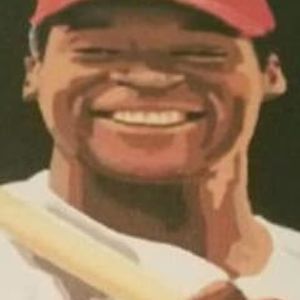
Richard A. Allen
03/08/1932 - 12/07/2020
Dick loved horses and spent hours riding his horse, Old Blaze, in nearby Fairmount Park while with the Phillies. Despite his powerful physique, Dick dreamt of being a jockey: “I’m one of those guys who would like to weigh about 115 pounds for a couple of hours in the afternoon and then go back to my own size about 5 o’clock.” He would maintain a fondness for horses for the remainder of his life. Another one of Dick’s passions was music, especially singing. In 1968, he formed the Ebonistics, a doo-wop group, and recorded the song “Echoes of November,” which became an R&B hit in the Philadelphia area. In January 1969, Dick and the Ebonistics performed the song during halftime of a Philadelphia 76ers game at the Spectrum in Philadelphia.
Dick was traded to the St. Louis Cardinals in 1970 and later to the Los Angeles Dodgers. In 1971, Dick joined the Chicago White Sox and became a major force with resuscitating a fledgling ballclub. He carried the White Sox on his broad shoulders into pennant contention in 1972. He was far and away the most talented player on the team. Attendance grew during his playing time, and new life and respect had returned to the Sox franchise.
Dick was the most dominant player in the American League – if not in all of baseball – in 1972. He led the league with 37 home runs and 113 RBIs and was the starting first baseman on the AL All-Star team. The season was full of memorable moments, but none as dramatic as Sunday, June 4. The White Sox hosted the New York Yankees in a doubleheader at Comiskey Park before a crowd of 51, 904. In game two, Dick came off the bench to pinch-hit in the bottom of the ninth inning with two runners on and the White Sox trailing 4-2. He blasted a long three-run homer off Sparky Lyle to give Chicago a dramatic 5-4 win and a sweep of the twin bill. On July 31, he would hit two inside-the-park home runs in a game against the Minnesota Twins. He would earn American League Most Valuable Player status in 1972.
Dick twice led the American League in home runs, including the 1972 season when he was named the Most Valuable Player after hitting .308 with 37 home runs, 113 RBI, 99 walks, a .420 on-base percentage and a 1.023 OPS. His only postseason appearance came in 1976, when he made three starts for the Phillies in the National League Championship Series.
Dick would rejoin his beloved Phillies in 1975 and round out his uniformed baseball career with the Oakland A’s in 1977. He finished his career at the age of 35 with a .292 average, 351 home runs, and 1,119 RBIs. Dick and his brothers Hank and Ron were unique in America’s favorite pastime. They were one of the few three brothers to have played ball consecutively in the majors.
Dick worked in the 1980s rebuilding his life and would later co-author an autobiography. He worked briefly with the Texas Rangers as a coach. He also appeared at baseball card shows across the United States with his beloved wife Willa, played in several Cracker Jack Old-Timer’s games throughout the major leagues and supported numerous charities.
Throughout his career, Dick was a seven-time All-Star (1965-67; 1970; 1972-74). He played nearly every position on the field during his career but is widely known as a first and third baseman. Dick became one of the all-time greats in Phillies history after being signed by the team in 1960 to his first professional contract. He joined the Phillies front office in 1994 as a fan representative and later, a club ambassador.
The Phillies would bestow the highest honor a club can confer upon a former player by retiring Dick’s No. 15 in a ceremony this past September 3, 2020, the 57th anniversary of Dick’s major league debut with the Phillies.
During his life, he would marry twice, Barbara Moore (1961-1981) and Willa King (1987-present). Dick joined the ancestors on Monday, December 7, 2020 after a courageous battle with cancer. He is preceded in death by his parents Coy Allen and Era Rhodes Craine Allen; his daughter, Terri; his siblings, Coy Allan (JoeAnn), Dorothy Etta Daniels (David), Helen Elizabeth Craine, Iona Bernard (Everett), Sarah Lee Eady (William), and Caesar W. Craine (Ruby). Dick leaves behind his wife, Willa; two sons, Richard (Doobie) Jr. and Eron (Button) Dekov; one grandson, Richard (Tre) III; two brothers, Harold and Ronald (Marthella); and a host of nieces, nephews, cousins, friends and fellow teammates.
Excepts for this synopsis are attributed to Rich D’Ambrosio